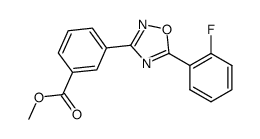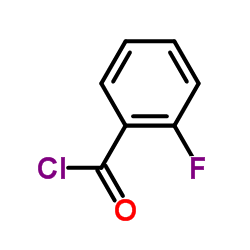775304-57-9
| Name | 3-(5-(2-Fluorophenyl)-1,2,4-oxadiazol-3-yl)benzoic acid |
|---|---|
| Synonyms |
3-[5-(2-fluorophenyl)-1,2,4-oxadiazol-3-yl]benzoic acid
Ataluren Benzoic acid, 3-[5-(2-fluorophenyl)-1,2,4-oxadiazol-3-yl]- PTC124 |
| Description | Ataluren (PTC124) is an orally available CFTR-G542X nonsense allele inhibitor. |
|---|---|
| Related Catalog | |
| Target |
CFTR[1] |
| In Vitro | This premature “stop” signal (a class I mutation) prevents the cell from producing a full-length CFTR protein[1]. Ataluren (PTC124)-a new chemical entity that selectively induces ribosomal readthrough of premature but not normal termination codons[2]. |
| In Vivo | Ataluren (PTC124) activity, optimized using nonsense-containing reporters, promotes dystrophin production in primary muscle cells from humans and mdx mice expressing dystrophin nonsense alleles, and rescues striated muscle function in mdx mice within 2-8 weeks of drug exposure. Ataluren (PTC124) is well tolerated in animals at plasma exposures substantially in excess of those required for nonsense suppression[2]. To induce nonsense suppression and increase PPT1 enzyme activity, the read-through drug Ataluren (PTC124) is given via intraperitoneal (i.p.) injection to male Cln1R151X mice at 2 months of age. These treatments are performed four times daily for 2 consecutive days in a proof-of-principle study. Used at 10 mg/kg, Ataluren (PTC124) increased PPT1 enzyme activity (P=0.0001 by unpaired t-test) and protein level (P=0.0014 by unpaired t-test) in the liver, but did not increase PPT1 enzyme activity or protein level in the cortex. This tissue-specific effect is likely due to the inability of Ataluren (PTC124) to breach the blood brain barrier (BBB), which decreased the bioavailability of Ataluren (PTC124) within the brain, and prevented Ataluren (PTC124) from reaching an efficacious concentration within the therapeutic window[3]. |
| Cell Assay | Duplicate samples of HEK293 cells harbouring LUC-190 (UGA) are incubated in the presence of 5 μM Ataluren (PTC124) (treated) or 1% DMSO (untreated) for 20 h. The cells are collected, washed twice in phosphate buffered saline (PBS), resuspended in sample buffer (Bio-Rad) and shipped on dry ice to Kendrick Laboratories for two-dimensional electrophoretic analysis Isoelectric focusing (pH 3.5-10) is carried out in glass tubes for 20,000 V-hours. One μg of a tropomyosin internal standard is added to each sample. Second dimension SDS slab gel electrophoresis is carried out for approximately 6 h at 25 mA per gel. After electrophoresis, gels are transferred to PVDF paper. Computerized analysis of spot mobility used Phoretix software[2]. |
| Animal Admin | Mice[3] Male mice are randomly assigned to either a treatment group or vehicle control group. Six to eight mice per group are treated with 10 or 100 mg/kg Ataluren (PTC124) dissolved in PBS containing DMSO (2% for 10 mg/kg and 20% for 100 mg/kg) and (2-hydroxypropyl)-β-cyclodextrin (22%) via intraperitoneal (i.p.) injections four times daily for 2 consecutive days. Six to eight control mice are treated with the vehicle of the drug: PBS containing DMSO (2% or 20%) and (2-hydroxypropyl)-β-cyclodextrin (22%). Immediately following the last injection on the second day, tissues are collected and stored at −80°C for further use. |
| References |
[1]. Pettit RS, et al. CFTR Modulators for the Treatment of Cystic Fibrosis. P T. 2014 Jul;39(7):500-11. |
| Density | 1.4±0.1 g/cm3 |
|---|---|
| Boiling Point | 503.7±60.0 °C at 760 mmHg |
| Molecular Formula | C15H9FN2O3 |
| Molecular Weight | 284.242 |
| Flash Point | 258.4±32.9 °C |
| Exact Mass | 284.059723 |
| PSA | 76.22000 |
| LogP | 3.73 |
| Vapour Pressure | 0.0±1.4 mmHg at 25°C |
| Index of Refraction | 1.604 |
|
Material Safety Data Sheet
Section1. Identification of the substance Product Name: Ataluren Synonyms: Section2. Hazards identification Harmful by inhalation, in contact with skin, and if swallowed. Section3. Composition/information on ingredients. Ingredient name:Ataluren CAS number:775304-57-9 Section4. First aid measures Skin contact:Immediately wash skin with copious amounts of water for at least 15 minutes while removing contaminated clothing and shoes. If irritation persists, seek medical attention. Eye contact:Immediately wash skin with copious amounts of water for at least 15 minutes. Assure adequate flushing of the eyes by separating the eyelids with fingers. If irritation persists, seek medical attention. Inhalation:Remove to fresh air. In severe cases or if symptoms persist, seek medical attention. Ingestion:Wash out mouth with copious amounts of water for at least 15 minutes. Seek medical attention. Section5. Fire fighting measures In the event of a fire involving this material, alone or in combination with other materials, use dry powder or carbon dioxide extinguishers. Protective clothing and self-contained breathing apparatus should be worn. Section6. Accidental release measures Personal precautions: Wear suitable personal protective equipment which performs satisfactorily and meets local/state/national standards. Respiratory precaution:Wear approved mask/respirator Hand precaution:Wear suitable gloves/gauntlets Skin protection:Wear suitable protective clothing Eye protection:Wear suitable eye protection Methods for cleaning up: Mix with sand or similar inert absorbent material, sweep up and keep in a tightly closed container for disposal. See section 12. Environmental precautions: Do not allow material to enter drains or water courses. Section7. Handling and storage Handling:This product should be handled only by, or under the close supervision of, those properly qualified in the handling and use of potentially hazardous chemicals, who should take into account the fire, health and chemical hazard data given on this sheet. Store in closed vessels, refrigerated. Storage: Section8. Exposure Controls / Personal protection Engineering Controls: Use only in a chemical fume hood. Personal protective equipment: Wear laboratory clothing, chemical-resistant gloves and safety goggles. General hydiene measures: Wash thoroughly after handling. Wash contaminated clothing before reuse. Section9. Physical and chemical properties Appearance:Not specified Boiling point:No data No data Melting point: Flash point:No data Density:No data Molecular formula:C15H9FN2O3 Molecular weight:284.2 Section10. Stability and reactivity Conditions to avoid: Heat, flames and sparks. Materials to avoid: Oxidizing agents. Possible hazardous combustion products: Carbon monoxide, nitrogen oxides, hydrogen fluoride. Section11. Toxicological information No data. Section12. Ecological information No data. Section13. Disposal consideration Arrange disposal as special waste, by licensed disposal company, in consultation with local waste disposal authority, in accordance with national and regional regulations. Section14. Transportation information Non-harzardous for air and ground transportation. Section15. Regulatory information No chemicals in this material are subject to the reporting requirements of SARA Title III, Section 302, or have known CAS numbers that exceed the threshold reporting levels established by SARA Title III, Section 313. SECTION 16 - ADDITIONAL INFORMATION N/A |
| Hazard Codes | Xi |
|---|---|
| HS Code | 2934999090 |
|
~95% 
775304-57-9 |
| Literature: PTC THERAPEUTICS, INC. Patent: WO2007/117438 A2, 2007 ; Location in patent: Page/Page column 261 ; |
|
~78% 
775304-57-9 |
| Literature: PTC THERAPEUTICS, INC. Patent: WO2008/30570 A1, 2008 ; Location in patent: Page/Page column 23-24 ; |
|
~% 
775304-57-9 |
| Literature: Bioorganic and Medicinal Chemistry Letters, , vol. 24, # 11 p. 2473 - 2476 |
| Precursor 3 | |
|---|---|
| DownStream 0 | |
| HS Code | 2934999090 |
|---|---|
| Summary | 2934999090. other heterocyclic compounds. VAT:17.0%. Tax rebate rate:13.0%. . MFN tariff:6.5%. General tariff:20.0% |


